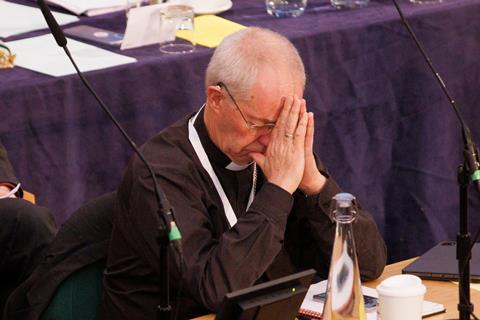Justin Welby has said that church decline was something he “personally” counts as “failure”. Responding to the news, Phil Knox says Christians of all denominations should be seeking to encourage their leaders. Few of us can understand the deep challenges they're facing, he says

Archbishop Justin Welby has presided over a difficult season for the church and society.
For any leader, a global pandemic, cost of living crisis, political turmoil, the threat of World War III and death of a monarch would provide a tumultuous landscape, but for the leader of the Church of England and Anglican Communion, it has increased the pressure to an already tricky tenure.
It’s easy to play armchair Archbishop. I was dismayed by the failure to uphold biblical orthodoxy at the last General Synod, but I thought he did an outstanding job at the Queen’s funeral, the Coronation of King Charles, and has spoken out well on important issues.
I have huge sympathy for him in lots of ways, which is why I understand and admire his desire to take responsibility for the recent decline in numbers attending church.
During a wide ranging interview at Religion Media Festival, Welby said, "The further decline in the Church is something that in the end, even if I’m not – and I’m not saying I’m not – but even if I were not to be responsible for, I’m certainly accountable for, so that I personally I count as failure."
Welby is right to question whether he is directly responsible for decline, after all Jesus did promise "I will build my church" (Matthew 16:18). I don't think leaders are supposed to put that burden on themselves.
Wherever we fall on the question of accountability for church decline, I want to take this opportunity to encourage the Archbishop, and others, in their desire to make disciples.
First, the challenges in the Anglican Church are just one part of the overall picture. I preach in a different church almost every week and there is life everywhere. I regularly meet new Christians, encounter passionate and innovative expressions of church and get to encourage teams of leaders doing an extraordinary job. Across a range of denominations, contexts and backgrounds, God is on the move.
Second, the landscape is constantly in flux and the cultural winds are not blowing in our favour. Some people are still only just returning to church after Covid. I met with one leader recently who told me he’d “lost the battle to Sunday football”, with several key families prioritising their children’s sporting ability over their spiritual development. Too many of my friends are more passionate about their house extension than following Jesus. For many in our generation, comfort is the enemy of growth. It is a challenge to all of us, but for leaders, it is easier to lead wholehearted disciples than those whose commitment is constantly wavering.
Third, while leadership can be catalytic in transforming a church, and its failure lead to catastrophic results, we all have a part to play. For most people coming to faith at the moment, it’s not a preacher, minister or a bishop making the biggest difference, it’s a friend, a family member, colleague or neighbour. All of us contribute to the big picture and we can also probably offer more support in this area.
So what can the rest of us do about it?
1. Encourage. To encourage is to literally "pour heart into".
2 Corinthians 4:16 tells us not to lose heart. In the words of my colleague’s email sign-off, "Encouragement is like oxygen to the soul."
For every strongly worded email or passive aggressive handshake after the service, send a text, card, fax, letter or high five emoji of support. Most leaders are far more fragile than they appear and your exhortation with go further than you realise. Pray for them and with them.
2. Offer friendship. Some 2017 research from the US found that leaders have a much smaller support network than the average person. This isolation, in the end will have an impact on their emotional health and overall wellbeing. It may not be appropriate or reciprocated, but the gift of your friendship could make a real difference in encouraging a leader drowning in relational poverty. For a season I had a breakfast every Thursday morning with my vicar for over five years. It was a source of great blessing to me, and hope it helped him too.
3. Show up. Church attendance habits seem to have been changing, with people more likely to turn up less than weekly. Sunday attendance isn’t the only metric by which we should judge the health of a church, but it is usually the one moment in the week where the whole community gather. It matters to your leader that you are there. Few of us get everything we want out of a Sunday service. That’s not the point. The worship isn’t for us. When it comes to gatherings I have to get myself out of the mindset of how much this will meet my needs and into that of how my presence will be the blessing that it could be to others.
So Justin, don’t be so hard on yourself or your fellow leaders. Most are doing a great job. Thank you for all you do. We all have a part to play in the growth of the church. Let’s continue to play it well, bless and encourage our leaders and live with grace and hope. Take heart today.






































No comments yet